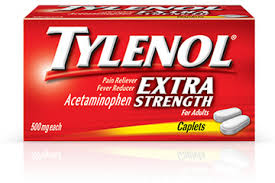
The Ten Worst Medications for Your Liver
 The Ten Worst Medications for Your Liver
The Ten Worst Medications for Your Liver
The liver is the main organ for maintaining the body’s internal environment. Liver failure is always scary because there is currently no way to protect against the absence of liver function. Think about it this way: we can use dialysis to take over for the kidneys or a mechanical ventilator if the lungs fail . . . but there is nothing to compensate for the liver.
Medications are an important cause of liver injury. While there are more than 900 drugs and herbs reported to cause liver injury, ten medications stand out for their potential to cause liver damage. Two thousand cases of liver failure occur each year in the United States and 50% of them are due to medications. Here are ten medications, both over-the-counter and prescription, that are rare-but-known causes of liver damage.
- Acetaminophen (Tylenol). Of the liver failure cases attributed to medications, 37% are due to acetaminophen. Acetaminophen works well as a fever reducer and pain reliever—but make sure to keep your use under 2 grams a day, and don’t exceed the recommended dose of 4 grams a day. Many over the counter products contain acetaminophen (Theraflu, Nyquil, Dayquil, etc) and that’s where folks get into trouble. Read the ingredients.
- Amoxicillin/clavulanate (Augmentin). Augmentin is an antibiotic used for bronchitis, sinus and throat infections. Liver damage from Augmentin can occur shortly after you start taking it, though signs of liver injury are often detected even after you’ve stopped the medication.
- Diclofenac (Voltaren, Cambia). Any NSAID (non steroidal anti-inflammatory drug) can cause liver injury, but it is most common with diclofenac. Liver injury from diclofenac can happen weeks to months after you start taking it. It is very rare, but affects susceptible individuals for reasons we don’t know.
- Amiodarone (Cordarone, Pacerone) is a heart medication used to control the rhythm in people with atrial fibrillation. After taking it for weeks to months, liver cell injury has been observed.
- Allopurinol (Zyloprim). Taken for the prevention of gout attacks, liver injury from allopurinol may happen within days to weeks of starting it.
- Seizure Medications. This whole class of medications is a problem, as several anti-epileptic medications can cause liver damage. Dilantin (phenytoin) can cause liver damage shortly after you start taking it, which is why your liver tests will be monitored. Valproate, carbamazepine, and lamotrigine can also cause liver injury which may declare itself later, after you’ve been taking it for weeks or months.
- Isoniazid. If you have a positive TB (tuberculosis) skin test (a “positive PPD test”) you may be prescribed 3 – 6 months of isoniazid (also known as isonicotinylhydrazide or INH) therapy. INH is a well known cause of acute liver injury which occurs weeks to months after you start taking it. This is why you are told not to drink alcohol while taking INH.
- Azathioprine (Imuran). Azathioprine is a medication that controls the immune system. It is used in Crohn’s disease and autoimmune hepatitis, among other things. After weeks to months of taking azathioprine, damage to the liver can occur. I’ve seen this happen, keep an eye on the liver while taking this medication.
- Methotrexate. Used for many conditions, including rheumatoid arthritis and ectopic pregnancy, liver levels will be monitored while you are taking methotrexate because of the relatively common adverse liver effects.
- Risperidone (Risperdal) and quetiapine (Seroquel) are both used as antipsychotics and antidepressants. These medications can cause a blockage of the flow of bile from the liver (drug-induced cholestasis).
Honorable mention. You may wonder about the statin cholesterol medications and abnormal liver function tests. While atorvastatin, simvastatin, lovastatin and pravastatin can frequently affect liver function blood tests, they do not tend to cause significant liver injury. Animal studies reveal that very high doses of statins may cause hepatotoxicity (damage to the liver), but typical doses of the drug are not associated with significant liver injury. Liver cell injury from statins is exceptionally rare in humans.